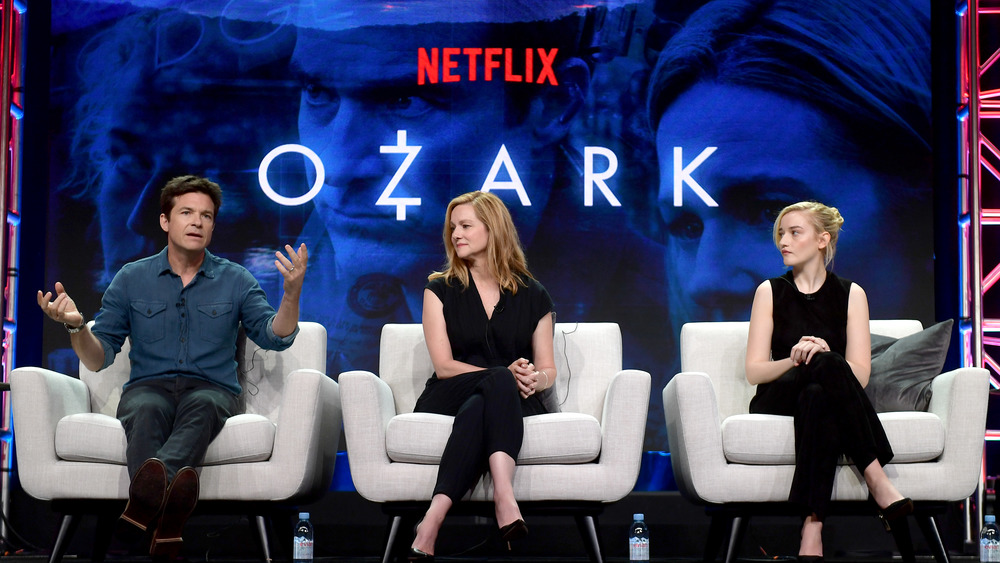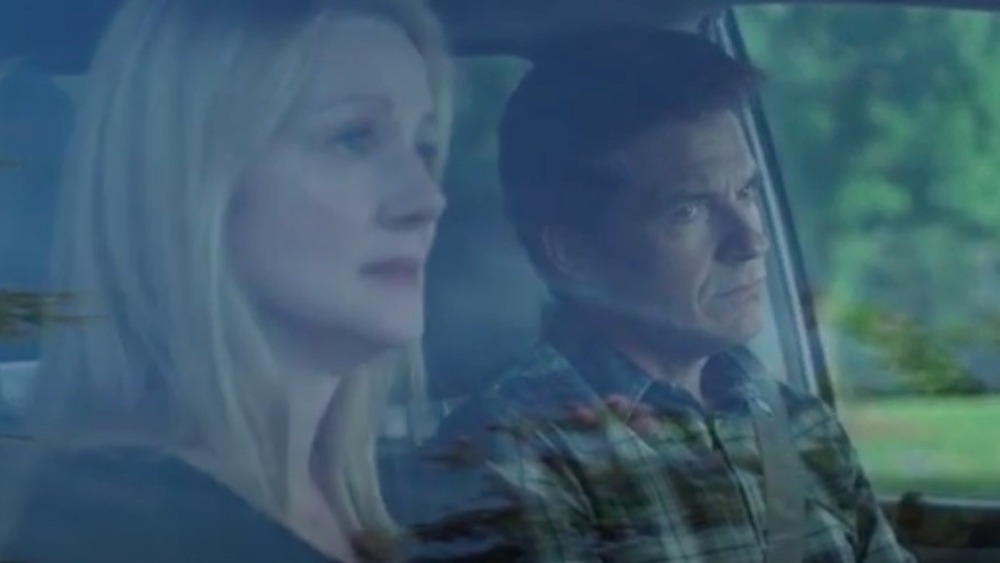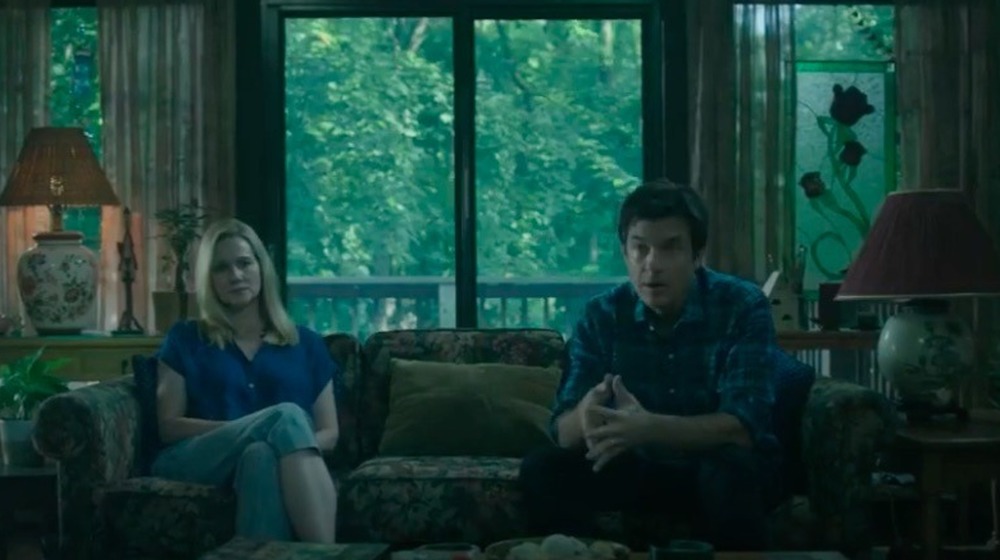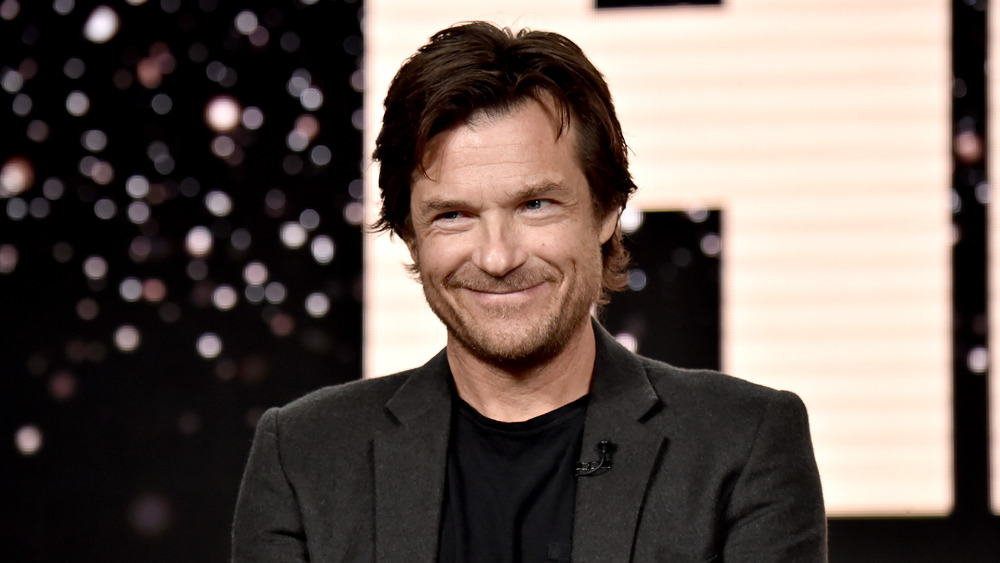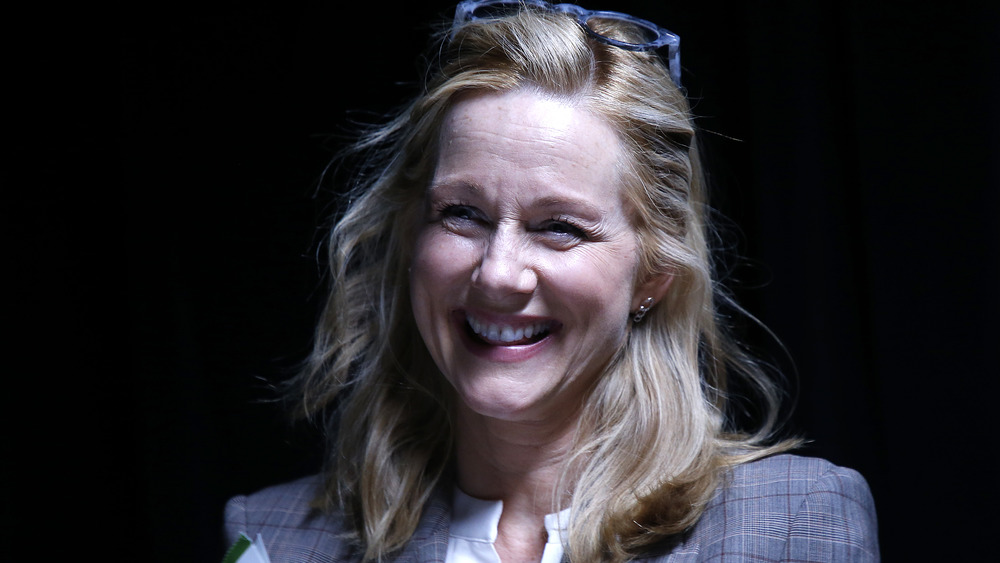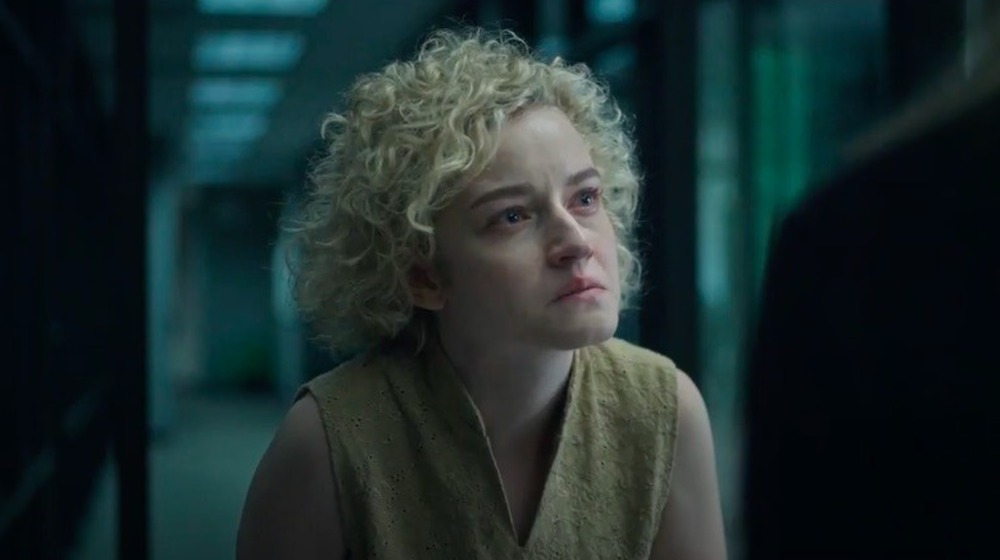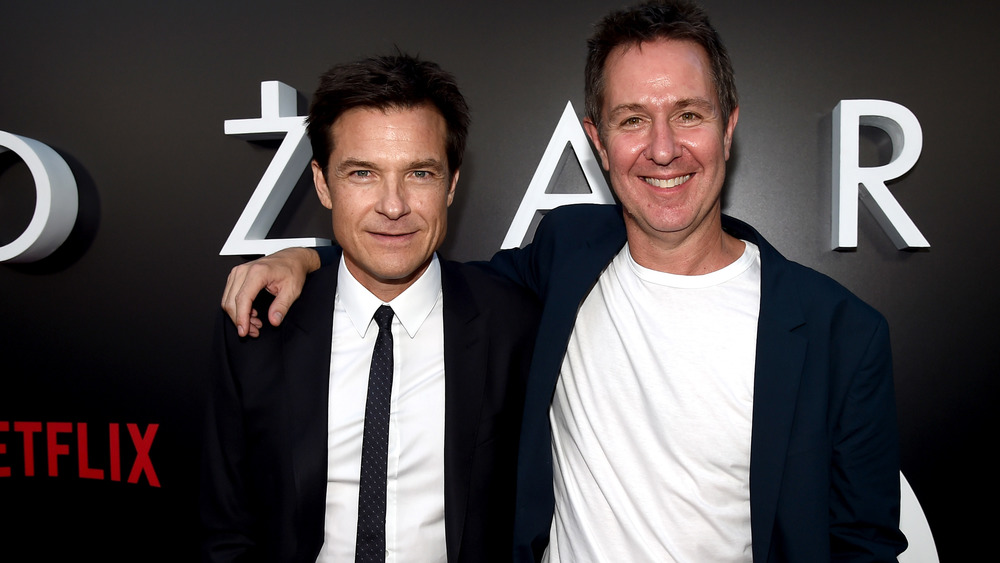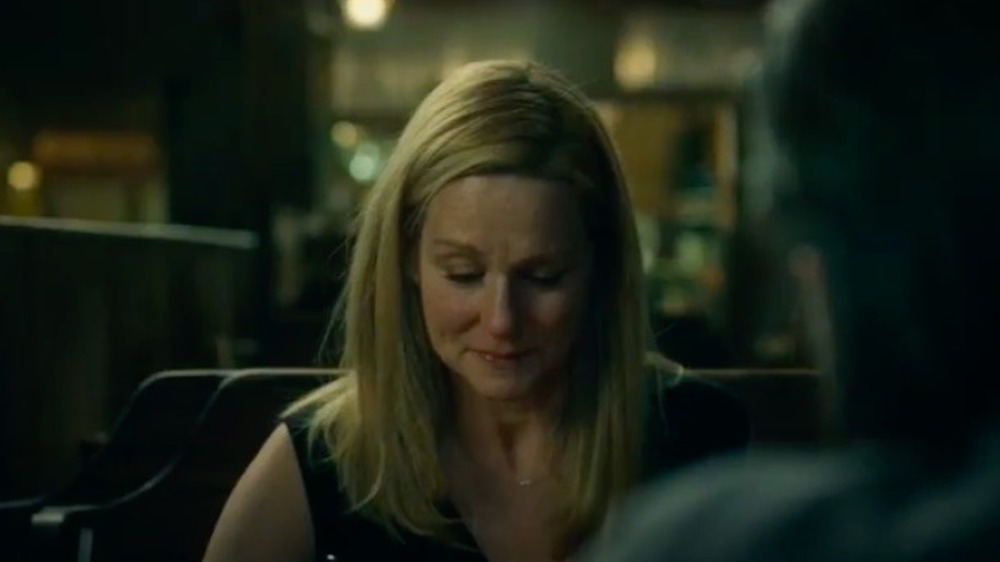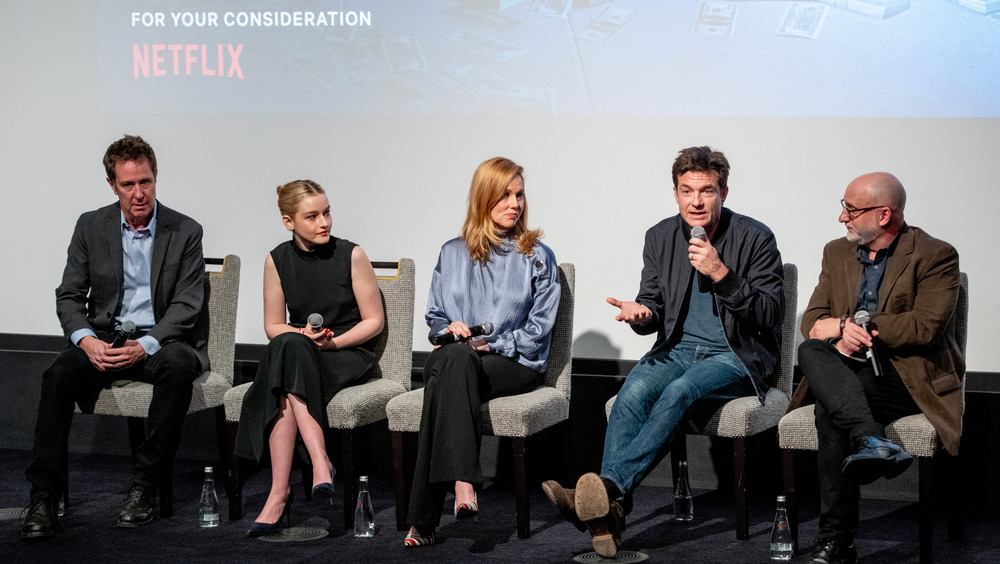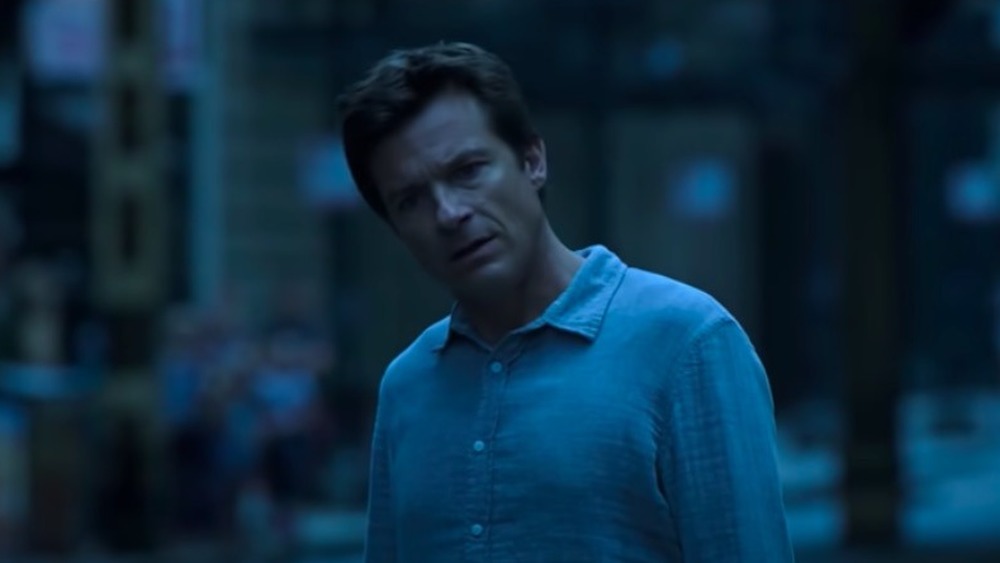The Untold Truth Of Ozark
Created by Bill Dubuque and Mark Williams, Ozark centers on the Byrde family and their relocation to the Ozarks for better business opportunities. When put like that, the scenario almost sounds wholesome: a family man trying to provide for his wife and kids the best that he can. Except, that business in question is a very illegal one called money laundering and the show, while focused on a family, is anything but wholesome.
The pilot introduced Marty Byrde, played by Jason Bateman (who also serves as an executive producer and frequent director), a Chicago financial advisor whose partner gets them into some serious hot water with one of their biggest clients: a Mexican drug cartel. Fearing for his life (after the death of his business partner), Marty convinces the cartel that he'll relocate the whole operation to the Lake of the Ozarks, in Missouri. He claims it's out of the Feds' range and a better place to launder money, promising millions of dollars in profit. His desperate idea works and Marty subsequently moves with his wife Wendy (Laura Linney) and their kids to the Ozarks.
Here is a breakdown of all the details behind the popular Netflix show.
Co-creator Bill Dubuque spent summers in the Ozarks as a teen
One of the show's creators, Bill Dubuque, took inspiration from his own life — specifically, the summers he spent in the Ozarks as a teenager. Dubuque, a native of St. Louis, told the St. Louis Post Dispatch that as a teen he spent his summers about a two-hour car ride from his hometown at the Lake of the Ozarks, which would, of course, later become the titular setting of his successful television show.
The article explained, "Dubuque has been fascinated by Lake of the Ozarks since he worked there in summers as a teen. At the family-owned Alhonna Resort and Marina, he did 'pretty much everything,' from handyman chores to working on the dock to manning a barbecue grill."
Spending so many summers there, Dubuque got to know the location well. Years later, upon creating his show, he found it to be the perfect setting for a money laundering drama. "The lake is both a real thing and a metaphor for capitalism," Dubuque said, "After all, it was built by Union Electric to make money."
Dubuque wanted the core of the show to be "a family story"
In the same interview with the St. Louis Post Dispatch, Dubuque delved into how he created the show around the idea of the family. He wanted the family story to "feel real while raising the stakes." He discussed how all of the drama needs to tie into something that the viewers would feel connected to emotionally. Dubuque continued, "If viewers don't care about the family, even after all the evil things they're involved in, they won't feel invested."
Showrunner Chris Mundy echoed this idea in an interview with The Hollywood Reporter while discussing how the writers go about developing a season's overarching plot points. He agreed that any crime committed by a character won't matter much to an audience if there's no "emotional resonance." He said that all of the show's writing is filtered through the family lens, which makes all the difference in impact: "We found that the show doesn't work if we don't think of it framed through the marriage and framed through the family."
Frequent director Jason Bateman lets the actors lead the way
Jason Bateman, who portrays protagonist Marty, is more than just the lead of the show. He is also an executive producer and a frequent director. For season one, he even wanted to direct all 10 episodes, but found the workload a bit too heavy. Instead, he directed the first two and the final two of the season.
While speaking to The Hollywood Reporter, Bateman discussed his experience working as a director for Ozark. When asked what kind of notes he gives his co-stars, he admitted he keeps his notes light, opting instead to let the actors take the lead on the details of their characters.
Explaining his belief that an actor has a "right to play the character the way they want to play it," Bateman said, "I have a very, very light touch when directing an actor. I'm assuming they're doing the best job they can. I'm assuming that they're playing the part the way they want to play it."
Julia Garner came up with her character's accent
Julia Garner plays Ruth Langmore, a member of a local crime family. Garner has garnered praise for her performance and has even won two consecutive Emmys in the category for Outstanding Supporting Actress in a Drama Series. Garner's portrayal includes a memorable and strong Southern accent which, as it turns out, she began putting on without any direction to do so — right from the start, during her audition.
In an interview with Fashion magazine, Garner revealed she prepared for her audition with an accent because she really wanted the role and wanted to give it her all. She told the magazine, "And when I got to the audition, I could hear the other actors reading their lines, and was like, 'None of them have the accent, I'm screwed.' But I couldn't remember my lines when I wasn't doing the accent. So, I just had to do the accent — and it worked."
When asked if putting on an accent makes it easier to get in and out of character, Garner responded that it was because it was "like putting on a wig." She continued, "If you do something that's different, you can just go home and be you. You don't have to take the character with you." Yet, in a Vulture interview on YouTube, Garner admitted that the accent has become very much "second nature" to her, and that sometimes she accidentally breaks into it without realizing.
Laura Linney made sure Wendy Byrde was fleshed out
Laura Linney, who plays Marty's wife Wendy Byrde, was uncertain about committing to a series regular role prior to Ozark, but ultimately decided to take on the part of Wendy after finding out about the involvement of Bateman, who she was curious to work with. Once she did sign on, she wanted to make sure that her character was more than "just a wife."
In an interview with The Wrap, Linney discussed how when she first read the script, she liked what she read, but was struck by Wendy being nothing more than the wife character. She explained that Wendy "needed some work," which she spoke to Bateman about. She said, "We talked about the role and where I felt it needed to go. And he said yes, they would do that."
Believing that Bateman would take her suggestions seriously, she signed onto the series and is extremely grateful to be a part of a show that is such "a collaborative environment." She added, "Ultimately I went with my gut, which told me this was something I should do and be involved with."
Garner had trouble adjusting to the intensity
Ozark is an intense show, full of high stakes storylines that may even delve into hard-to-watch territory. Ruth's character arc is no different; it involves abuse by her father and the very memorable moment when Ruth electrocutes her two uncles to death. While speaking to The Gentlewoman magazine, Garner discussed the ways in which this character has taken a toll on her, especially with the show's 16-18 hour shooting days.
Garner said, "When I was first playing Ruth, it was really tough. It almost felt like I had been hit with a frying pan every single night." When asked how she decompresses after long hours of working with extreme scenarios and emotions, Garner acknowledged watching (much lighter) television, such as The Real Housewives of Beverly Hills. She also credited spending time with her co-stars, all of whom she said she is really close to.
Garner recently has had to adjust in a different way: coming to terms with the show ending after its fourth and final season. During a panel interview with The Sun, Garner said, "When I came back to Atlanta, there's a part of me that's super excited. But also I'm just like, 'Oh, my God, I'm super depressed,' because this show's ending. This show means so much to me."
Showrunner Chris Mundy and Bateman get emotional killing off characters
Showrunner Chris Mundy spoke with The Hollywood Reporter about becoming emotionally detached from characters he's helped develop, only to see some of them killed off. There have been plenty, from Russ and Boyd Langmore in the first season to, more recently, top cartel attorney Helen Pierce.
Mundy told THR, "I'll say as a writer — and a fan — of the show, it's really sad to see a character go." He brought up the characters of Pierce (Janet McTeer) and Ben Davis (Tom Pelphrey), both of whom died in season 3. Mundy continued, "Janet herself, she is smart and funny and lovely, and so we're just going to miss having her around. And the same with Tom — he just stepped into this show, and it was like he'd been there from the beginning."
Jason Bateman, as executive producer, has also spoken out about becoming emotional over a character's death. Asked in a separate interview with THR if he has second-guessed the death of any character, he answered with an assured "all of them." He explained, "Selfishly, you want everyone to stick around. We had a really great group of actors. It's terrible when these people have to go, but that's the trade-off of doing these kinds of shows...you've got to leave it all on the table every episode, every year."
The producers say the pandemic has increased Ozark's popularity
When COVID-19 led to a widespread lockdown in March 2020, many people turned to streaming services to pass the time. Meanwhile, season 3 of Ozark just happened to drop on Netflix on March 27, 2020. The Hollywood Reporter detailed the show's increase in popularity, revealing that the third season outpaced the previous one by nearly four million viewers. Within the first 10 days of its premiere, it garnered about 8.7 million viewers.
Jason Bateman discussed the substantial increase of people watching the show in an interview with Deadline. He said, "We are very proud of what we did, but we would be lying if we said we didn't have a little virus aid...We had some gratuitous timing with the show coming out when everyone had nothing to look at except their walls and television. Hopefully people liked what they were looking at."
Bateman's co-star, Laura Linney, added that the cast and crew being in their stride for the third season likely helped keep audiences captivated as well. She explained, "There's something about familiarity. You can hit the ground running."
The writers learned the details of money laundering
While co-creator Bill Dubuque envisions the show as a family story at its core — which is undeniably a key fact in its success — the plot still relies heavily on the process of money laundering. The showrunners and producers knew that getting the details of the illegal practice right was essential to telling the strongest story possible.
An in-depth feature on Ozark from Drama Quarterly revealed that the writers met with both an FBI agent and a hedge fund manager to ask questions and learn the logistics of money laundering.
Showrunner Chris Mundy acknowledged that while the details of the operation were undoubtedly important, what they really wanted to hone in on were the motivations behind an intense desire to make more and more money. He said, "We did want to get caught up in the emotional desire for it: what motivates people for it — is it family? Greed? Is it escape? Is it a blessing or a curse?...We just keep digging into the humanity of the whole situation."
Bateman knows how the series will end -- and is satisfied with it
With the popular series ending with season 4, fans are likely dying to know how the ending of Ozark is set to play out for the Byrde family and the rest of the characters. The extended season will contain 14 total episodes, split into two equal parts, and began production in September of 2020.
In an interview with IndieWire, Bateman revealed that he would not be directing any season 4 episodes, instead wanting to focus on his roles as executive producer and actor. Still, he could not keep himself from finding out how the show will conclude. He talked to showrunner Mundy to find out the fate of the family and said he didn't pester Mundy too much about the details, mostly just wanting to know the bigger picture. He told IndieWire, "I was interested in the big question he has the opportunity to answer: Are they going to get away with it, or are they going to pay a bill? What does he want to message to the audience about the consequences of what the Byrdes have done — or lack thereof?" As for what Bateman thinks of the ending? He calls it "great."
Overall, Bateman is extremely proud of the show, making the final season a victory lap for a project that has proved extremely fulfilling. Bateman said, "It is working out better than I could have ever hoped for, and I had high, high hopes."
